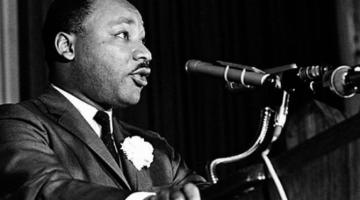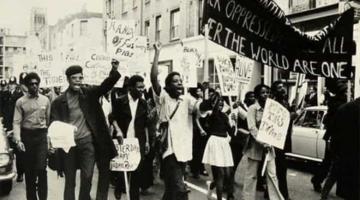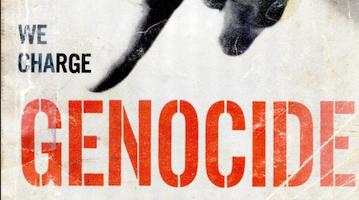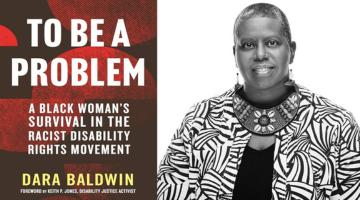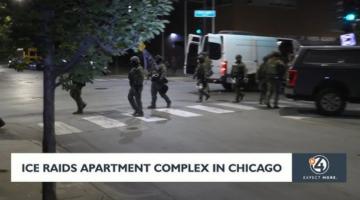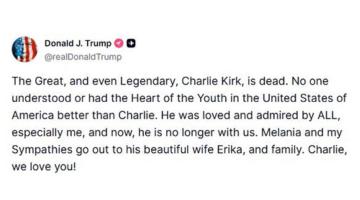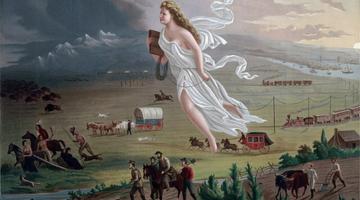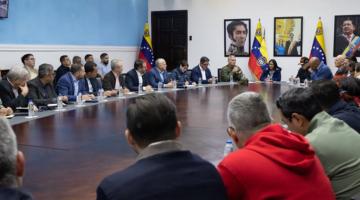Paul Robeson submitting a petition called “We Charge Genocide: The Crime of Government Against the Negro People” from the Civil Rights Congress to the United Nations.
Liberals are demanding that Black people in the U.S. put aside our long tradition of anti-imperialism to support Kamala Harris and sacrifice Palestine in the process.
Originally published in Mondoweiss.
Symbolism is a necessary means for laundering imperialism. Not only does it bribe the people with amorphous “progress” but it pits struggles in opposition against those that would otherwise be in harmony. Enter Vice President Kamala Harris, where since she entered the 2024 U.S. presidential race there has been a growing hoard of online propaganda suggesting Black people in the United States should barter genocide for “democracy.” Some members of VP Harris’s online followers, known as the Khive, have a history of harassment, bullying, and creating fake accounts to amplify reactionary rhetoric, so it should be no surprise this mouth-foaming discourse continues to bubble.
Apparently, “democracy” is when Black people must choose between maintaining our dwindling civil rights or shipping 250-pound bombs to explode Gazan schools full of Palestinians praying in peace. Otherwise, if we refuse this dead-end choice, we must want the other guy to win. This zero-sum exchange was on display during a Detroit, Michigan rally on August 7 when Harris smugly shouted down pro-Palestinian protesters, “You know what? If you want Donald Trump to win, then say that. Otherwise, I’m speaking!”
Immediately, her mammy for empire impression emboldened her base. The crowd raved in cheers and chants, heralding her as a no-nonsense Black woman letting those snot nose protesters know who’s boss. This dismissive response has ruffled Palestinians and Palestinian supporters alike; some had hoped Harris may depart ways with President Biden’s steadfast support of Israel’s carnage in Gaza. The Harris campaign quickly shot down such hopes when they clarified their opposition to any arms embargo on Israel’s slaughter. Since then the U.S. has approved 20 billion dollars in weapons sales to the Zionist State. But it need not matter since Harris is the imperialist woman our Black grandmothers always dreamed of becoming, so we’re told.
Zero-sum issues
During each U.S. election, hope and fear work hand in hand to widen the wedge between self-interest and solidarity. The State conditions U.S. Americans to view their problems as micro group “issues.” Corporate media reports on polling where voters rank which issues they feel most impacted by. Rarely are the sources of the issues accurately explained, elaborated upon, or adequately organized against. Rather, both political parties rely on scapegoats to explain people’s problems—the return of Trump, the evil immigrants are coming, radical left or right-wing takeover, taxes, inflation— so voting becomes an exercise of keeping the scapegoat out of office just as much, if not more, than the false feeling of progress. Imperialism, the dominant cause of our issues, becomes a deleted scene from the fear-mongering script we call a ballot.
Accordingly, when Black people vote we are mostly following the script already written out for us. Casting a different script is deemed unrealistic by our leaders and influencers. Therefore, the dead infant in Gaza decapitated by U.S. bombs or the hungry child in the Congo mutilated by U.S.-backed militias are unfortunate outcomes, yes, but essentially viewed as out of our control. We are sold that our “issues” must take precedence over the deaths financed in our names. We are taught to chase the bag while Palestinians are left holding it—sorting out their remains.
This do-or-die logic sprouts from the class antagonisms that form inside this internal neo-colony of the U.S. We learn how to sacrifice the Black poor for Black Elite gains, long before we bargain a Palestinian life for a tax credit. That is to say, we learn imperialism at home well before we learn it abroad.
‘We Charge Genocide‘
Imperialism has nearly always been at the root of Black issues because it requires the economic, social, and political domination of the “dark world” for white capital to function. Cheap land, depressed wages, exploitable resources, and stigmatized populations are a necessity for domination. In the early 20th century these issues became more pronounced. With the rise of white monopoly capital, oppressed peoples’ struggles became even more connected, due to what Russian revolutionary Vladimir Lenin called the “socialization of production.” Increasingly, labor existed within a global supply chain that fed into capitalists’ profits. Cheap markets became a premium.
But imperialism does not just require a monopoly on markets or labor, but also on violence. The racial lynchings, police brutality, and race massacres of the early to mid-20th century were not just domestic disturbances. They were extensions of an imperialist State that harnessed violence to keep the areas where Black people inhabited cheap and submissive to the capitalist order. Thus, it was the full spectrum dominance of U.S. imperialists that inspired the Civil Rights Congress (CRC) in 1951 to file the We Charge Genocide petition to the newly formed United Nations.
Written to bring U.S. crimes of genocide against Black people to a global body, the document was in concordance with the United Nations Convention on the Prevention and Punishment of Genocide. Hence, the CRC did not put the blame solely at the feet of Southern racists but the entire “unified policies of every branch of government.” They were clear in the role that global capitalism played in their oppression:
“The Negro is oppressed in the United States not because of God but because of monopoly capital. His oppression is the foundation of the political and economic control of the entire American people by a reactionary clique. His low pay, bad health, and lack of education result in the deliberate physical destruction of the Negro people. But they also result, as we shall show billions of dollars of annual profit to American monopoly.”
The paper also names how the terrorism at home via nearly 1,955 lynchings between 1889 and 1901 went “side by side” with the “terror unleashed abroad, as American imperialism entered the international arena by subjugating the Filipino, Puerto Rican and Cuban peoples.”
Despite the petition garnering wide international attention, the U.S.-influenced UN did not accept it. William Patterson, executive director of the CRC, was stripped of his passport by the U.S. State Department after delivering the petition to the UN in Paris, France. The New York Times published a hit piece with Dr. Raphael Lemkin, the zionist lawyer who coined the term genocide, dismissing it as communist propaganda. The NAACP, at the request of the U.S. State Department, called We Charge Genocide “gross and subversive”, repudiating the “unfounded claims of genocide against the United States Government.” Between the Black Scare/Red Scare Cold War and the handkerchief heads of imperialism, We Charge Genocide never penetrated the Black masses as it should have.
Frigid Black liberalism
By 1951, the NAACP was part of an emerging block of elite Black Cold War liberals whose primary aim was upward mobility into white society, not confrontation with the U.S. Empire. With the dark cloud of the McCarthy era (1947–1956) looming over the times, they sold out Black radical internationalist politics for an integrationist bootstrap approach. Their strategy was to bargain patriotism for civil rights. Thereby domesticating the Black struggle to U.S. borders, and rejecting organizing that harmed the U.S. globally. Thus, as the Africana Studies Scholar, Dr. Charisse Burden‑Stelly argues, Black Cold War liberals “reduced the collective agency of Africana people.”
Sadly, any inflection point that sounded the alarm on their narrow cause was disregarded. When the U.S. antagonized Cuba so much so that it nearly resulted in nuclear war, Black Cold War liberals largely backed the president’s reckless actions. While the U.S. was disproportionately sending Black soldiers to die in the imperialist Vietnam War (in 1965, Black soldiers were 31% of the ground combat battalions, despite being 12 percent of the U.S. population), they remained silent until it was safe to disobey. After Dr. Martin Luther King Jr. courageously delivered his Beyond Vietnam speech, realizing that his “Beloved Community” of eradicating poverty could not function in tandem with a militaristic war machine, the NAACP board called it a “serious tactical mistake.” In addition, Black Cold War liberals left the Student Nonviolent Coordinating Committee to sink when they lost funding due to their criticism of Zionism and support for Palestine.
It should be evident that this Black liberal buffer class did not just fall out of a coconut tree. They exist in the context of all of what has been peddled to us since the 1970s. They are now the vanguard of U.S. Blackness as more radical Black political forces were severely diminished or outright eliminated by the State. They are the Black role models—athletes, entertainers, professionals, journalists, pundits, ministers— who set the ideological norms and aspirations for the masses of Black people. Despite the relentless propaganda, Black people resiliently remained the most anti-war racial group in the United States until the election of President Barack Obama. This was predictable since the same class discarded
Obama’s former minister, Reverend Jeremiah Wright, for his anti-imperialist sermons. Black liberals consistently stifle significant organizing around such sentiments.
Meanwhile, the blood of the masses swims in the water as each issue receives a worse solution from Black liberals. George Floyd is killed by the police, they partner with predatory banks to build “generational wealth.” Breanna Taylor is killed innocently by police inside her own home, sure give more money to the pigs who killed her. Rayshard Brooks is dropped dead by a cop in a parking lot, by all means, go build a simulation city for cops and charge those who oppose it with domestic terrorism. So of course, with their dogmatic devotion to ruthless pragmatism, no matter the cost, they will pick the first Black woman president over ending a genocide. It’s a natural reflex since they already choose symbolism every day over the end of Black genocide in the United States.
Palestine, what can be
Despite the perils of Black liberalism, the movement to #FreePalestine allows us to be unburdened by what has been a neo-colonial stranglehold. It offers an opportunity to confront the primary source from where our issues stem: U.S. Imperialism. The U.S. produces a military expenditure of over 1.5 trillion dollars a fiscal year, with 902 military bases worldwide. The U.S. leads over 74 percent of all military spending on the planet. It sanctions nearly 1/3 of the world to economic doom. This level of hyper-imperialism cannot simply be voted out of office. If a ceasefire is reached tomorrow U.S. imperialism will still have the power to enable a new genocide elsewhere.
I urge all Palestinian people—do not trust Black Liberalism for it is a front for U.S. imperialism. It provides secular appeals to Blackness that may feel inclusive and even communal at times, but ultimately it converts our feelings of belonging into agents of empire. Whatever good it brings is gravely weakened by its aimless platitudes and vicarious modes of racial uplift. It immobilizes the Black masses (only 27% of the voting-eligible Black population voted in all three of the last elections: 2018, 2020, and 2022). Moreover, Black people have much richer traditions upon which to draw. These traditions understood Palestine as a means for demonstrating that our issues are interlocked, for better or worse.
To conclude, imperialism impedes human freedom. Thus, wherever the mechanisms of imperialism have been weakened or abolished, humanity has benefited immensely. When the Haitian revolution defeated the French and abolished slavery, their revolution helped ignite a firing squad of U.S. slave revolts that brought chattel slavery to its knees. When colonies in Africa and Asia bled for their independence, the U.S. was forced to yield concessions to the Black Freedom Movement or suffer a gash to global legitimacy. Each death blow to imperialist forces that immeasurably weaken their capacity for domination and dispossession inches us closer to liberation. Therefore, a truly free Palestine is not a “single issue” to barter for another, it’s fundamental for Black liberation to flourish because there can be none while capitalism and imperialism persist. Long live the resistance.
Too Black is a poet, scholar, filmmaker, and organizer. He is host of the Black Myths Podcast, co-director of the documentary film The Pendleton 2: They Stood Up and author of the book Laundering Black Rage. He is based in Indianapolis, IN and can be reached at tooblack8808@gmail.com.


